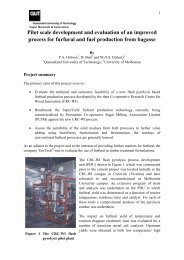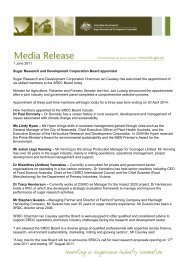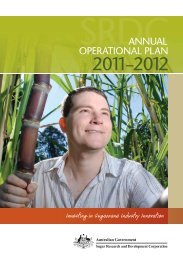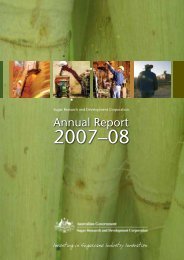Section 2 - Sugar Research and Development Corporation
Section 2 - Sugar Research and Development Corporation
Section 2 - Sugar Research and Development Corporation
You also want an ePaper? Increase the reach of your titles
YUMPU automatically turns print PDFs into web optimized ePapers that Google loves.
Emerging technologies<br />
Key<br />
Performance<br />
Indicator<br />
Enhanced approaches<br />
for sugarcane genetic<br />
improvement<br />
Measure Technologies developed that<br />
accelerate the delivery of<br />
improved varieties for sugar<br />
production <strong>and</strong> value-added<br />
products.<br />
More Crop per Drop<br />
This project was initiated to determine the<br />
potential of Australian sugarcane germplasm to<br />
develop water use-effi cient <strong>and</strong> drought tolerant<br />
commercial cultivars.<br />
Water stress is the major constraint to<br />
productivity in the Australian sugar industry<br />
costing an estimated $260 million per annum.<br />
About 40 per cent of the Australian sugarcane<br />
production is rain-fed with or without<br />
supplementary irrigation. Because of erratic<br />
rainfall <strong>and</strong> the increasing cost <strong>and</strong> restrictions<br />
on water use, effi cient use of available water is<br />
an important priority in irrigated production<br />
systems.<br />
Field experiments were conducted for three<br />
years under rain fed, fully irrigated <strong>and</strong> managed<br />
drought conditions at three locations in northern<br />
Queensl<strong>and</strong>. The agronomic <strong>and</strong> cane yield<br />
characteristics, fi bre, sugar <strong>and</strong> sugar quality<br />
characteristics <strong>and</strong> physiological traits related to<br />
drought tolerance were collected during the crop<br />
growth period <strong>and</strong> at harvest.<br />
Analysis of the data showed complex interactions<br />
between type of stress, response of traits to<br />
stress, trait effects on growth <strong>and</strong> yield <strong>and</strong> other<br />
environmental parameters.<br />
These traits are proving useful to characterise<br />
clone behaviour under different stress<br />
environments to identify desirable trait<br />
combinations <strong>and</strong> genotypes (ideotypes) suitable<br />
for different production conditions, which is<br />
the focus of the second phase of this research<br />
(BSS305).<br />
EMERGING TECHNOLOGIES<br />
Extending <strong>Sugar</strong>Booster <strong>Sugar</strong>Booster technology is a recent<br />
breakthrough with the potential to generate<br />
sugarcane lines producing the sugar isomaltulose<br />
as well as higher yields of sucrose <strong>and</strong> other<br />
fermentable sugars.<br />
If able to replicate this success in the fi eld,<br />
these genetically modifi ed varieties will yield<br />
more sugar, making farms more profi table<br />
<strong>and</strong> effi cient, as well produce another valueadding<br />
product.<br />
The major output of the project is the fi rst<br />
knowledge of the performance under fi eld<br />
conditions of SI-transformed sugarcane lines.<br />
Additional outputs are: methods developed for<br />
effi cient gene transfer into diverse, smut-resistant<br />
Australian sugarcane cultivars (submitted for<br />
publication); fi rst development of trial designs<br />
for effective early-stage selection of improved<br />
transgenic sugarcane lines (in collaboration with<br />
BSES); evidence that a workable proportion of<br />
transgenic lines from current protocols can match<br />
the recipient cultivar for cane yield after several<br />
fi eld propagations to obtain quality planting<br />
material. The technology has been licensed for<br />
commercial use by CSR (Sucrogen) (UQ040).<br />
SRDC Annual Report 2010–2011 55






